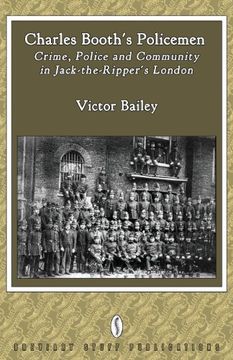Compartir
Charles Booth's Policemen: Crime, Police and Community in Jack-The-Ripper's London (en Inglés)
Victor Bailey
(Autor)
·
Breviary Stuff Publications
· Tapa Blanda
Charles Booth's Policemen: Crime, Police and Community in Jack-The-Ripper's London (en Inglés) - Bailey, Victor
39,69 €
41,78 €
Ahorras: 2,09 €
Elige la lista en la que quieres agregar tu producto o crea una nueva lista
✓ Producto agregado correctamente a la lista de deseos.
Ir a Mis Listas
Origen: Estados Unidos
(Costos de importación incluídos en el precio)
Se enviará desde nuestra bodega entre el
Martes 25 de Junio y el
Viernes 12 de Julio.
Lo recibirás en cualquier lugar de España entre 1 y 5 días hábiles luego del envío.
Reseña del libro "Charles Booth's Policemen: Crime, Police and Community in Jack-The-Ripper's London (en Inglés)"
What explains the law-abidingness of late Victorian England? A number of modern historians contend that the answer lies with the effectiveness of policing, and with the imposition of a 'policeman-state' in Victorian and Edwardian England. Exploiting the vast archive that Charles Booth amassed for his leviathan social investigation to explore the social order of London's East End, Life and Labour of the People in London, this volume takes issue with this answer. The East End was notorious as a region of unalleviated poverty, crime and immorality, the district where the issue of large-scale Jewish immigration was first confronted, and where Jack-the-Ripper found his victims. Victor Bailey reveals that historians have overestimated the extent to which policemen were able or willing to intervene in the daily behaviour of inhabitants to suppress law breaking. He shows that the commission and repression of crime were linked not only to the structures of law enforcement but also to levels of community solidarity, associational life, family integration, and parental authority. Social order was a function less of policing than of a complex combination of informal family and community sanctions, the mixed welfare of charity and state support, the new board schools, slum clearance, and the negotiated justice of the magistrates' courts. The conclusions should lead us to question the role of the state in the making of social order, and to reinstate the force of informal social sanctioning.
- 0% (0)
- 0% (0)
- 0% (0)
- 0% (0)
- 0% (0)
Todos los libros de nuestro catálogo son Originales.
El libro está escrito en Inglés.
La encuadernación de esta edición es Tapa Blanda.
✓ Producto agregado correctamente al carro, Ir a Pagar.

